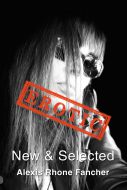 Alexis Rhone Fancher
Alexis Rhone Fancher
Erotic: New & Selected
NYQ Books
Reviewer: Ann Wehrman
Erotic: New & Selected showcases eighty poems by Alexis Rhone Fancher, accompanied by her original photography. Reflecting on erotic experiences as an adult and reaching back into girlhood, the narrative and prose poems chronicle passionate encounters and relationships in vignettes that sizzle with sensory detail. A gifted photographer as well as writer, Fancher enhances this collection with fourteen original black-and-white photographs, ranging from the gritty “Pawn Shop, Pacific St. San Pedro” to multiple “Self-Portrait” shots of small sections of a body, such as the curve of a chest as it slopes to the top edge of a bra. Creating worlds of their own, the poems (and photos) draw readers into unrestrained spaces where nothing is forbidden; indeed, where the forbidden is explored, craved, and reflected upon with unflinching directness.
Fancher writes in an honest, in-your-face manner that is sometimes shocking and often rueful in terms of tone. She moves back and forth between enjoying the moment and self-loathing, including sly humor and nostalgic feelings regarding the encounters portrayed and the people involved. A reader feels compassion for the collection’s characters despite noting a certain relational callousness and frequent end results of loss and pain. The reader also acknowledges the strength of the writer, both in courageously exploring the world of personal desire and in reaffirming life after each soul-deadening disappointment or betrayal.
In “Let’s Be Happy Now,” Fancher drips sarcasm, irony, and pain, leaving no doubt about the difficulty of finding happiness in love, whether married or not:
Not the marrying kind.
I’m the fucking kind.
The lewd lingerie kind.
The girl you
bring home for
the weekend,
not to meet the family
kind.
The dirty little secret,
the girl you jack off to after
your wife
goes to sleep.
The one you think about
so you can get it up with
the old lady,
year after year,
decade after dreary
decade. The one you wish you’d married
& you’d be happy now,
happy now,
so very happy,
now.
Reading the way in which Fancher surgically dissects the man’s motivation, one feels the stifled atmosphere of a locked room, the hopelessness and self-judgment of the speaker. The poems in Erotic explode with life force, raging against restriction, while the speaker is simultaneously subdued, almost as if wearing an emotional ankle monitor. In poem after poem, the apparent realization that uncensored license has resulted mostly in suffering, not happiness or lasting love, reminds the reader of the unresolved ethical dualism with which society oppresses women and with which women oppress themselves.
While groundsworkers’ noisy, dusty presences often create complaints, in “Below our bedroom window,” the poet paints a picture of a hot day during which tree trimmers worked outside the speaker’s bedroom window, screams of their chainsaw overshadowing coital moans, the workers’ voyeuristic presence enhancing rather than impeding the couple’s lovemaking:
the gardeners are cutting down the giant yucca tree with a chainsaw, while inside, we have sex. It’s a turn on, one man inside me, and two outside, silhouetted against the vertical blind; it makes me even louder than usual. But my moans are obliterated by the chainsaw’s guttural wail, mixed with the gardeners’ chatter, as they sever the yucca’s limbs. Twin brothers, the gardeners arrive bi-weekly to manicure the grass, trim the hedges. They’re identical, stocky, bearded. Muscles ripple their shirts. Tools hang from their utility belts, sagging their jeans.
…
Afterward, I rush to the window to view the carnage. The brothers long gone. The yucca, in pieces, spilling sap, mirrors the trickle down my inner thighs.
When is a poem not a poem? When it is a manifesto, a cry, a declaration of survival. Fancher knows that; in the prose poem, “This Is NOT a Poem,” she affirms it for the readers who have eyes to see and ears to hear:
This is NOT a poem. Bam! This is an assault to your senses, a rape of your status quo. This is NOT a poem, not some trendy leopard print, not a polka dot parade. No. You do not smell hot dogs, cotton candy or frankincense. The myrrh has left the building. This is NOT a poem. It’s an anthem, a declaration of noncompliance, a liberation proclamation. Snap! Snap! This is NOT a poem. It’s a love song, a torch song, a song of myself and NOT you. No tears, got it? Don’t act like a girl. Blow your nose wipe your eyes …. Don’t push too hard. I might surprise you. You’ll see, I’m tougher than I look: I eat Bukowski for breakfast.
Like the musical gods about whom parents warn teens, generation after generation, Fancher refuses to pay tribute to socially established sexual oppression. Her poetry in Erotic remains true to the title and may be read that way. Yet, one must also celebrate the spirit of the writer who fearlessly explores the outer reaches of lust, sensuality, and sexual encounter, and honestly reflects on the experience, acknowledging pleasure and disillusion alike. Fancher’s narratives and language convey resilience and indomitable defiance; however, a tough exterior often masks inner vulnerability.
Erotic speaks directly, claiming the right to voice the power of sexuality that arguably belongs to all people, all genders, although in today’s world that right is often denied. As human love is more than physical, Erotic also uncovers the agony that can result from sex without love. Despite the frequent bleakness of the poems, Fancher also seems to suggest that as long as living hearts beat, chances for healing remain. Joyful unity through passionate love, often seeming impossible over the centuries, might turn out to be humanity’s birthright and, someday, its destiny.

